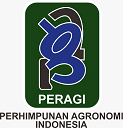Effect of Plant Growth Promoting Rhizobacteria in Cultivation of Tomato (Lycopersicum esculentum Mill.)
Abstract
The effect of Plant Growth Promoting Rhizobacteria (PGPR) in tomato plants can impact plant growth and production with the relationship between bacteria and plant roots. This research aimed to decide the benefits and impacts of PGPR on the development and production of tomato plants. The research was conducted within the Research facility of Seed Science and Innovation of Agrotechnology Consider Program of Syiah Kuala University, Exploratory Plant of Staff of Horticulture, Syiah Kuala University from February 2023 to December 2023. This study used 2 designs, namely the Complete Randomized Design and Randomized Group Design of factorial pattern. Non-factorial RAL uses 1 factor studied, namely rhizobacterial isolates (R) consisting of one control treatment and five kinds of isolates. Factorial RACT was used to treat two tomato varieties consisting of Servo (V1) and Gammara (V2). Subsequently, 2x6 medications were obtained, each treatment was rehashed 3 times, hence 12 treatment combinations and 36 exploratory units were obtained, whereas each test unit utilized 3 plant tests so that there were 108 plants in add up to. If the results of the F test show significant influence, then the analysis continues with further testing using DMRT (Duncan Multiple Range Test) test at the 5% level. The results of the consider, that the arrangement of rhizobacteria as PGPR in tomato plant development does not have a noteworthy impact. The utilization of Servo and Gammara tomato plant assortments has a critical impact on tomato plant development.
Keywords
Full Text:
PDFReferences
Aisyawati, L., Dewi, H. A., Daroini, P. B., Mariyono, J., & Latifah, E. (2021). Selection of chilli and tomato cultivars for mitigation of climate change and realization of sustainable production. IOP Conference Series: Earth and Environmental Science, 648(1). https://doi.org/10.1088/1755-1315/648/1/012107
Asfin. (2017). "Response of Two Tomato Varieties (Lycopersicon Esculentum Mill.) to the Application of Various Concentrations of Plant Growth Promoting Rhizobacteria (PGPR) in Saline Conditions. [Thesis]. Malang. Brawijaya University. Retrieved from https://repository.ub.ac.id/id/eprint /132166/
Assadiyah, A. N., Dewanti, F. D., & Sulistyono, A. (2023). Response of Tomato (Solanum lycopersicum L.) Plant Yield to Types of Planting Media and Concentration of Liquid Organic Fertilizer from Fruit Peel Waste. Agro Bali : Agricultural Journal, 6(1), 93–104. https://doi.org/10.37637/ab.v6i1.1079
Badan Pusat Statistik. (2022). Harvest area and production of horticultural crops in Indonesia Retrieved from http://bps.tnmnhrt.go.id.
Dani, U., Budiarti, A. N. S., & Wijaya, A. A. (2021). Application of Chicken manure Dosage and Plant Growth Promoting Rhizobacteria on the Growth and Yield of Shallot Plants (Allium ascalonicum L.). IOP Conference Series: Earth and Environmental Science, 748(1). https://doi.org/10.1088/1755-1315/748/1/012044
Dunan, N., dan Diana, S.H. (2018). Vegetative characters of various tomato varieties to aluminum application in nutrient culture media. Journal of Tropical Agriculture. 9: 72- 79. Retrieved from https://jurnal.usu.ac.id/index.php/Tropik.
Elena, T., Surya,P. (2022) effect of planting distance and variety on growth and production of long bean pods (Vigna sinensis L.). Agrifor 21(2):275. DOI:10.31293/agrifor.v21i2.6131
Fiqa, A. P., Nursafitri, T. H., Fauziah, & Masudah, S. (2021). Effect of environmental factors on the growth of selected Dioscorea alata L. accessions from the botanical garden collection. Journal Agro 8(1), 25-39. https://doi.org/10.15575/10594
Gau, A. D. T., Syam’Un, E., & Ulfa, F. (2021). Application of Bacillus subtilis on red onion (Allium ascalonicum). IOP Conference Series: Earth and Environmental Science, 921(1). https://doi.org/10.1088/1755-1315/921/1/012078
Harahap, R.K. (2018). Effect of plant growth-promoting rhizobacteria types as biofertilizer and varieties on the growth and yield of soybean (Glycine max L. Merril). [Thesis]. Banda Aceh. Syiah Kuala University. Retrieved from https://etd.usk.ac.id/index.php?p=show_detail&id=4820.
Indah L,D., & Titiek I (2018). The effect of the concentration of PGPR (Plant Growth Promoting Rhizobacteria) on the growth and yield of two soybean (Glycine max L. Merril) VARIETIES. Journal of Crop Production, 6(7), 1336–1343. Retrieved from http://protan.studentjournal.ub.ac.id/index.php/protan/article/view/783.
Khumairot F. (2014). Growth and production of shade-tolerant tomato (Lycopersicon esculantum Mill.) in intercropping pattern. [Thesis]. Faculty of Agriculture.Bogor. IPB University. http://repository.ipb.ac.id/handle/123456789/72315.
Mahmood, S. A., Aldabagh, E. J., Aljanabi, A. R., & Jabbar, A. (2023). Potential of Plant Growth Promoting Rhizobacteria on Growth of Potato ( Solanum tuberosum L) under Field Condition. IOP Conference Series: Earth and Environmental Science, 1213(1). https://doi.org/10.1088/1755-1315/1213/1/012039.
Purwantisari, S., Parman, S., Karnoto, & Budihardjo, K. (2019). The growth and the production of potato plant supplemented by plant growth promoting rhizobacteria (PGPR). Journal of Physics: Conference Series, 1217(1). https://doi.org/10.1088/1742-6596/1217/1/012144
Quinet M, Angosto T, Yuste-Lisbona FJ, Blanchard-Gros R, Bigot S, Martinez JP, Lutts S. (2019). Tomato Fruit Development and Metabolism. Front Plant Sci. 29;10:1554. DOI: 10.3389/fpls.2019.01554
Sofyan, A., Murdiati, M., & Mulyawan, R. (2022). Effect of PGPR Soaking on the Growth of Green Grass Grass Grass Stem Cuttings (Premna serratifolia L.). Agro Bali : Agricultural Journal, 5(2), 256–262. https://doi.org/10.37637/ab.v5i2.837
Stout, M., Kurabchew, H., & Leite, G. (2018). Host-Plant Resistance in Tomato. Sustainable Management of Arthropod Pests of Tomato, 217-236. https://doi.org/10.1016/B978-0-12-802441-6.00009-7
Yagmur, B., & Gunes, A. (2021). Evaluation of the effects of plant growth promoting rhizobacteria (PGPR) on yield and quality parameters of tomato plants in organic agriculture by principal component analysis (PCA). Gesunde Pflanzen 73. 219–228. https://doi.org/10.1007/s10343-021-00543-9
Yustiningsih, M. (2019). Light intensity and efficiency in shade and direct light plants. BIOEDU.Vol. 4 (43-48). https://doi.org/10.32938/jbe.v4i2.385
Zarei, T., Moradi, A., Kazemeini, S. A., Akhgar, A., & Rahi, A. A. (2020). The role of ACC deaminase producing bacteria in improving sweet corn (Zea mays L. var saccharata) productivity under limited availability of irrigation water. Scientific Reports, 10(1). https://doi.org/10.1038/s41598-020-77305-6
Zuluaga,M.Y.A., Karina, M.L.M., Begona, M.M., Luigi, L., Fabio,V., Tanja, M., Youry,P., Stefano, C., Elisete, P.R., & Andre, L.M.O. (2021). Inoculation with plant growth-promoting bacteria alters the rhizosphere functioning of tomato plants. Appl. Soil Ecol. https://doi.org/10.1016/j.apsoil.2020.103784
Refbacks
- There are currently no refbacks.

























